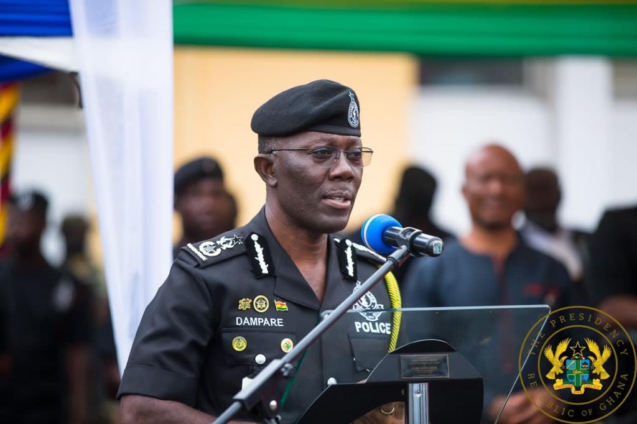IGP Dampare in the eye of the storm – officers give anonymous verdict!
George Akuffo Dampare is not just the youngest Inspector General of Police (IGP) in Ghana’s fourth republic. He is also the worst, per Commissioner of Police (COP) George Alex Mensah. At this point, the alleged plot by three senior police officers –COP Mensah, Superintendent George Asare and Superintendent Emmanuel Gyebi — to oust the current IGP is quite well established.
Also established is the largely positive Ghanaian public perception of IGP Dampare’s transformation agenda. In this raging saga, the crucial voice of the regular police officer appears missing.
To cure this deficit, I engaged two Chief Inspectors, one Constable, and one MTTU officer whose personal views I now share, anonymously.
IGP Dampare’s transformation agenda is apparently supported “by 50-70 per cent of the Police Service.” Inevitably, officers, formerly senior to Dampare, will react – fueled by their inordinate ambition, overriding partisanship, arrant insubordination, and personal hatred.
“Asare for example has been my Commander before. He doesn’t hide his political affiliations. He talks loosely. He insults his political opponents in the NDC freely. They are speaking for themselves and not for the Police service. Very soon, you will see some of them contesting on the tickets of the ruling NPP etc.”
What changes has IGP Dampare introduced, specifically? Improved working environment for officers at headquarters, who hitherto worked from containers, increasing public safety by deploying Formed Police Units in highly volatile areas and significantly boosting logistics and supplies – vehicles, motorbikes for patrol, forms for taking statements etc.
“We have been given three sets of uniforms, headgear and boots. Regarding boots, 60-70% of our needs have been met,” recounted one Police Officer. However, the deployment of these uniforms has raised other concerns, reflecting autocratic tendencies and little consultations. For uniformity, Dampare allegedly prescribed specific days for specific uniforms – long and short sleeves and camouflage.
“Considering various duty posts of officers – mosquitoes at night duties etc. – he could simply have prescribed colors and left the officers on operational duties to decide on long and short-sleeved uniforms. And I don’t think you can lead an organization like the Police Service without deep consultations.”
Promotions.
Promotions stirred the greatest controversy. Within the Police Service, promotions have three major constriction points: from Sergent to Inspector, Chief Inspector to Assistant Superintendent of Police, and Chief Superintendent to Assistant Commissioner of Police. IGP Dampare has apparently introduced policies that accelerate promotions. Where once, a Chief Inspector could serve over six years before being eligible to write promotion exams, the current policy sets a maximum four year-limit beyond which that Chief Inspector automatically qualifies for promotion examinations. While these positive changes are acknowledged, Dampare is also alleged to have promoted fresh graduates as Inspectors and Chief Inspectors, in flagrant violation of his own rules regarding a prescribed mandatory physical training course.
Additionally, Dampare has allegedly yielded to political influence in the appointment of fresh recruits into the service, undermining his public reputation as a disciplinarian.
“Ignorant political recruits with no experience and no specialized skills like medical doctors went through three to five months of training and are now getting to supervise experienced personnel like me.”
Staff Welfare and Professionalism
The verdict on Dampare’s prioritization of staff welfare seems unanimous. Greater accountability for more respectful relations, setting high expectations for professional behaviours, and improved medical care including care abroad, are routinely cited. Those who disagree, interestingly cite examples of Dampare’s “cruelty” that in fact affirm the perception of discipline and professionalism. Dampare allegedly cruelly transferred a senior police officer while interdicting others for what some consider minor professional breaches.
Unmistakably, some perceive Dampare as a hypocrite who panders to the public and cameras. This eye service – serving aspiring police recruits water etc. – irritates some police officers working under very hostile conditions including lack of access to decent toilet facilities etc.
In conclusion, clearly, the IGP is pursuing a reformist agenda, that is impacting officers and men in diverse ways. While rigorous law enforcement, professionalism and a facelift to the Police HQ are credited to him, autocratic tendencies are seen as a minus. Deepening consultations and consistent applications of policies without discrimination – real or perceived – could be areas for improvement for IGP Dampare.
Perhaps as one police officer concludes, “Previous IGPs like Nanfuri and Kwarteng-Acheampong also attracted a lot of criticisms. Today, they are seen as giants. Dampare is good!”
*****
The writer is the Chairman of the Centre for Social Justice, an Accra-based think tank advocating for progressive social transformation and people-centred development. www.csjghana.org. You can contact the writer via email at sodzitettey@gmail.com



